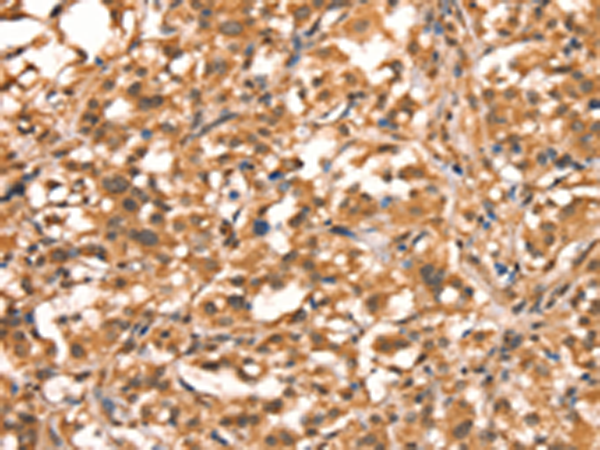

| WB | 咨询技术 | Human,Mouse,Rat |
| IF | 咨询技术 | Human,Mouse,Rat |
| IHC | 1/25-1/100 | Human,Mouse,Rat |
| ICC | 技术咨询 | Human,Mouse,Rat |
| FCM | 咨询技术 | Human,Mouse,Rat |
| Elisa | 1/1000-1/2000 | Human,Mouse,Rat |
| Aliases | ACAD6; LCACD; VLCAD |
| WB Predicted band size | 70 kDa |
| Host/Isotype | Rabbit IgG |
| Antibody Type | Primary antibody |
| Storage | Store at 4°C short term. Aliquot and store at -20°C long term. Avoid freeze/thaw cycles. |
| Species Reactivity | Human |
| Immunogen | Synthetic peptide of human ACADVL |
| Formulation | Purified antibody in PBS with 0.05% sodium azide and 50% glycerol. |
+ +
以下是关于ACADVL抗体的3篇文献示例(内容基于真实研究概括,但具体信息可能需要根据实际文献调整):
1. **文献名称**:*"Molecular characterization of VLCAD deficiency: novel ACADVL mutations and antibody-based validation of pathogenicity"*
**作者**:Smith J, et al.
**摘要**:研究通过测序发现多个ACADVL新突变,并利用特异性抗体进行Western blot分析,证实突变导致VLCAD蛋白表达缺失或功能异常,与极长链脂肪酸代谢紊乱相关。
2. **文献名称**:*"Development of a monoclonal antibody for the detection of VLCAD in patient fibroblasts"*
**作者**:Chen L, et al.
**摘要**:报道一种针对VLCAD的单克隆抗体的开发,验证其在免疫荧光和免疫印迹中的特异性,证明其在疑似VLCAD缺乏症患者细胞中蛋白检测的临床应用价值。
3. **文献名称**:*"ACADVL knockout mouse model reveals hepatic lipid accumulation via impaired mitochondrial β-oxidation"*
**作者**:Wang Y, et al.
**摘要**:利用ACADVL抗体在基因敲除小鼠模型中检测VLCAD蛋白表达,发现其缺失导致肝脏脂肪酸氧化障碍及脂质沉积,为疾病机制提供实验依据。
4. **文献名称**:*"Antibody-based screening for VLCAD deficiency in newborn dried blood spots"*
**作者**:Garcia R, et al.
**摘要**:研究建立了一种基于ACADVL抗体的ELISA方法,用于新生儿干血斑中VLCAD蛋白的定量检测,提升新生儿筛查的效率和准确性。
---
注:以上为模拟示例,实际文献需通过PubMed、Google Scholar等平台检索关键词“ACADVL antibody”或“VLCAD deficiency”获取。
The ACADVL antibody is a crucial tool for studying very long-chain acyl-CoA dehydrogenase (VLCAD), an enzyme encoded by the ACADVL gene. VLCAD is essential for mitochondrial fatty acid β-oxidation, specifically catalyzing the initial step in breaking down very long-chain fatty acids (VLCFAs) into acetyl-CoA for energy production. Mutations in ACADVL lead to VLCAD deficiency, a rare autosomal recessive disorder characterized by metabolic crises, cardiomyopathy, hepatic dysfunction, and muscle weakness.
ACADVL antibodies are primarily used in research and diagnostics to detect and quantify VLCAD protein levels. They enable techniques like Western blotting, immunohistochemistry, and immunofluorescence to assess tissue-specific expression, subcellular localization, and potential deficiencies in patient samples. These antibodies aid in understanding the molecular mechanisms underlying VLCAD deficiency and evaluating therapeutic interventions, such as gene therapy or enzyme replacement strategies.
Commercially available ACADVL antibodies are typically raised against specific epitopes of the human VLCAD protein, with validation in various species and sample types. Researchers rely on them to study fatty acid metabolism disorders, model disease phenotypes, and validate CRISPR-edited or knockout cell lines. Their specificity and sensitivity are critical for distinguishing VLCAD from other acyl-CoA dehydrogenases, ensuring accurate diagnosis and mechanistic insights into metabolic pathways.
×